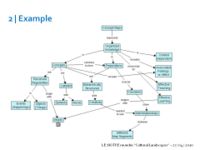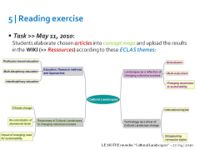Minutes April 27, 2010: Difference between revisions
Heike.kaiser (talk | contribs) |
Heike.kaiser (talk | contribs) |
||
| Line 93: | Line 93: | ||
A short '''question round''' proved that students had basically understood the next steps. | A short '''question round''' proved that students had basically understood the next steps. | ||
In addition, the students were requested to continue thinking about an appropriate case study for their online documentation among the '''[http://draco.hfwu.de/~wikienfk5/index.php/Student_Case_Studies_Seminar_Cultural_Landscapes_2010 Student Case Studies]'''. | In addition, the students were requested to continue thinking about an '''appropriate case study''' for their online documentation among the '''[http://draco.hfwu.de/~wikienfk5/index.php/Student_Case_Studies_Seminar_Cultural_Landscapes_2010 Student Case Studies]'''. | ||
As soon as they have selected a familiar or well-known project or site, they can list it among the thematic fields by student name and project title. | As soon as they have selected a familiar or well-known cultural landscape project or site (desirably in relation to a metropolitan area), they can list it among the thematic fields by student name and project title. | ||
'''''Note:''''' On '''May 11, 2010''' there will be a Vitero session dealing with detailed instructions how to proceed. | '''''Note:''''' On '''May 11, 2010''' there will be a Vitero session dealing with detailed instructions how to proceed. | ||
| Line 112: | Line 112: | ||
Image:100427_Folie19.JPG | Image:100427_Folie19.JPG | ||
Image:100427_Folie20.JPG | Image:100427_Folie20.JPG | ||
Image: LE NOTRE members room 2010_04_27 7_39_12 pm, kaiserh3086, agenda_heike-21, room.jpg | |||
Image:100427_Folie22.JPG | Image:100427_Folie22.JPG | ||
</gallery> | </gallery> | ||
Revision as of 08:46, 28 April 2010
UNDER CONSTRUCTION!!!
Round of missing Introductions
In the beginning the new participants were asked to also localise themselves on the World map and to introduce themselves by
- name,
- home town / country,
- study level
- intention for participating in this online seminar.
Seminar Process
After the introduction, Heike pointed out the schedule of this session referring to the seminar structure and process.
Introduction into Concept Mapping
First, Heike explained what is meant by the term concept map and showed an example. Furthermore, she pointed out advantages and use of concept maps and gave reference to two useful programs:
Moreover, she explained the task for this session as a practise and the following session from mid May on as a compulsory small group work (Minute Exercise).
Further information on this subject can be found here: Concept Map
Seminar Lecture: Landscape Character / Education, Research methods and Approaches
The divided lecture session started with a supplement to last week's session with regard to Landscape character (assessment) by Diedrich Bruns, Kassel University, dealing with
- Indicators of National Identity, Example: Slovenia
- Landscape Character Areas, Example: England
- CQC Joint Character Area profiles, Example: England
- Indicators of landscape character
- Indicator-Mix, Example: MEETNET
The lecture session was continued with Education, research methods and approaches by Sandra Bödding, Kassel Universiy, illustrating
- Comparison of two research areas: Hamburg - Wilhelmsburg and Bad Soden / Taunus
- Research aims
- Traditional landscape assessment methods
- Empirical social research
- Research results for both areas
- Conclusions
- Outlook
The slides are downloadable from the password-protected Moodle webpage from the link below, the password has been given to the seminar participants per e-mail.
Diedrich Bruns / Sandra Bödding: Landscape Character / Education, Research methods and Approaches
These are the participants' contributions:
Reminder: Land8Lounge, Seminar WIKI + Resources (Reading Exercise)
In the following, Heike reminded the participants to sign up in Land8Lounge and the specific discussion group as well as to register in the seminar WIKI with full name and a password free of choice as soon as possible in order to be able to upload and edit their contributions.
Apart from that, the Reading exercise was introduced shortly. The participants were asked as a next step to select an appropriate Topos article from the Resources by writing their full name behind the respective article. Alternatively, students can suggest other appropriate articles dealing with cultural landscapes in metropolitan regions to Heike.
The next step will be to create a concept map according to the main contents of the article by using one of the recommended graphic programs and then to upload the illustration to the respective thematic resources field. The results will be presented and discussed according to the thematic ECLAS fields during the sessions from May 11 - June 08.
A short question round proved that students had basically understood the next steps.
In addition, the students were requested to continue thinking about an appropriate case study for their online documentation among the Student Case Studies. As soon as they have selected a familiar or well-known cultural landscape project or site (desirably in relation to a metropolitan area), they can list it among the thematic fields by student name and project title. Note: On May 11, 2010 there will be a Vitero session dealing with detailed instructions how to proceed.
Lecture Recording
Please follow this link for listening to the seminar recording:
- [moodle link Recording April 27, 2010]




















